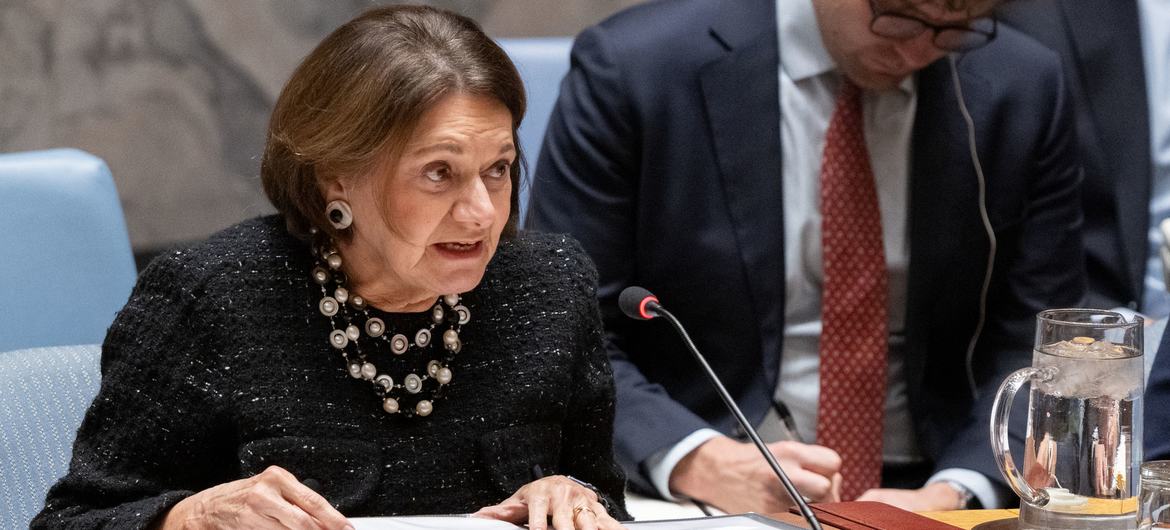Rosemary DiCarlo, the United Nations Under-Secretary-General for Political and Peacebuilding Affairs, arrived in Damascus on Monday for an official visit aimed at discussing recent developments in Syria’s political transition with the country’s new government.
According to UN spokesperson Stéphane Dujarric, DiCarlo is expected to underscore the UN’s commitment to supporting a comprehensive, Syrian-led and Syrian-owned political process, in line with the key provisions of UN Security Council Resolution 2254.
Following her meetings in Damascus, DiCarlo will continue her regional tour in Lebanon, where she is scheduled to meet with senior Lebanese officials, including Army Commander General Joseph Aoun, Prime Minister Nawaf Salam, Speaker of Parliament Nabih Berri, and Foreign Minister Youssef Raji. These meetings will build on the outcomes of UN Secretary-General António Guterres’ visit to Beirut in January.
In remarks from Beirut, Dujarric stated that DiCarlo will reaffirm the UN’s support for Lebanon’s commitment to implementing the cessation of hostilities agreement and UN Security Council Resolution 1701. She will also emphasize the critical role played by the United Nations Interim Force in Lebanon (UNIFIL) and the Office of the UN Special Coordinator in advancing stability.
DiCarlo’s visit will conclude with a field mission to southern Lebanon, where she will assess the humanitarian situation firsthand and inspect UNIFIL operational areas. Her visit comes amid growing challenges and pressing humanitarian needs that UN agencies are striving to address in affected regions.
Refugee Returns Accelerate Since Regime Change
The United Nations High Commissioner for Refugees (UNHCR) has reported that nearly 400,000 Syrian refugees have returned from neighboring countries since the fall of Bashar al-Assad’s regime on 8 December 2024. In addition, over one million internally displaced Syrians have returned to their home areas, bringing the total number of returnees to more than 1.4 million in recent months.
The UNHCR has identified the upcoming summer months as a critical opportunity for voluntary returns, particularly with the academic year ending. Improved security conditions in several areas have made this period especially conducive for displaced Syrians abroad to consider going home.
Despite the growing pace of returns, the UNHCR has warned that the long-term success of this process hinges on substantial support in key areas such as shelter, livelihoods, legal assistance, and protection. The agency highlighted a serious funding gap as the primary obstacle, threatening plans to facilitate the return of an additional 1.5 million people this year.
The agency cautioned that inadequate funding could lead many returnees to reconsider leaving Syria once again. Without the basic necessities that ensure a stable and dignified life, the prospect of return may remain short-lived.
90% of Syrians Still in Need of Assistance
The UNHCR estimates that 16.7 million people—roughly 90% of Syria’s population—still require some form of humanitarian aid. Additionally, more than 7.4 million people remain internally displaced.
The agency also noted that donor contributions have significantly declined in 2024 and 2025, forcing the UNHCR to scale back essential services. This decline could reduce its operational capacity inside Syria by up to 30%, severely limiting its ability to support returnees and vulnerable populations.
In its concluding statement, the UNHCR stressed the urgent need for sustained international support to reinforce its humanitarian mission and the efforts of its partners. It warned that continued funding cuts endanger millions of lives and jeopardize the safe and dignified return of displaced Syrians.
This article was translated and edited by The Syrian Observer. The Syrian Observer has not verified the content of this story. Responsibility for the information and views set out in this article lies entirely with the author.


